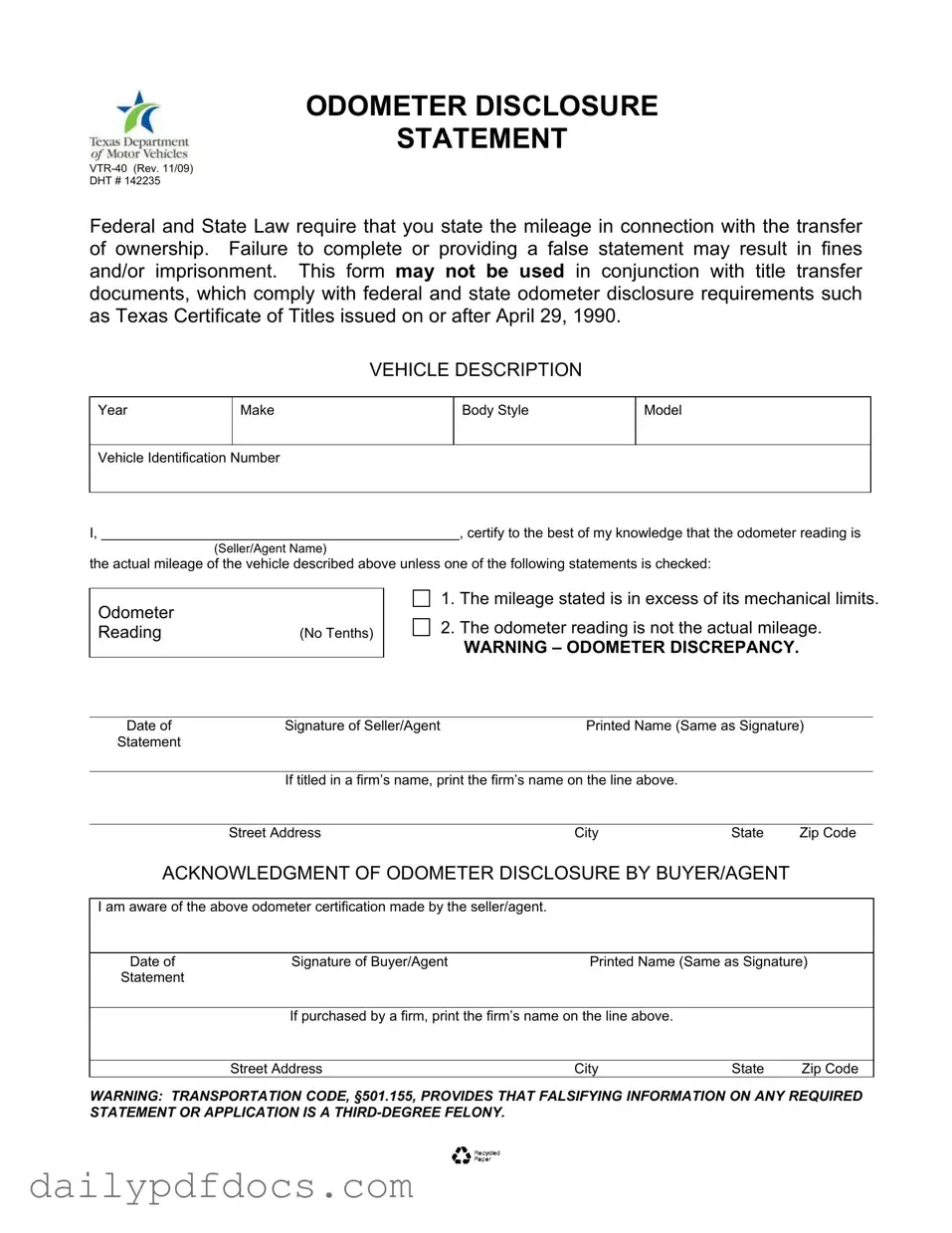Fill Your Texas Odometer Statement Form
The Texas Odometer Statement form, officially designated as VTR-40, plays a crucial role in the transfer of vehicle ownership within the state. This form is not just a formality; it is a legal requirement mandated by both federal and state laws. When a vehicle changes hands, it is imperative to accurately state the mileage to prevent any potential fraud. The form captures essential details such as the vehicle's year, make, model, body style, and Vehicle Identification Number (VIN), ensuring that the buyer receives a clear and truthful account of the vehicle's history. Sellers must certify that the odometer reading reflects the actual mileage unless specific exceptions apply, such as if the mileage exceeds mechanical limits or is otherwise inaccurate. Both the seller and buyer must sign the document, acknowledging the odometer disclosure, which serves as a protective measure against any discrepancies. Failure to complete this form truthfully can lead to serious consequences, including fines or imprisonment, underscoring the importance of compliance. This article will delve deeper into the specifics of the Texas Odometer Statement, outlining its significance, the completion process, and the legal implications of misrepresentation.
Find Other Documents
Bdsm List - Encourage self-discovery regarding personal limits.
For those considering the purchase or sale of a trailer, understanding the importance of a properly executed document is vital. A well-structured form can simplify the process and protect both parties involved. To learn more about this, refer to our guide on the crucial Trailer Bill of Sale documentation.
I864 - The form is central to the immigration process for family members.
Stock Transfer Form Template - This documentation is vital for legal compliance in stock transfers.
Common Questions
What is the Texas Odometer Statement form?
The Texas Odometer Statement form, also known as VTR-40, is a legal document required during the transfer of ownership of a vehicle in Texas. This form serves to disclose the vehicle's mileage at the time of sale. It is essential for both sellers and buyers to accurately report the odometer reading to comply with federal and state laws.
Why is the Odometer Statement important?
This statement is crucial because it helps prevent odometer fraud, which can mislead buyers regarding the actual condition and value of a vehicle. By certifying the mileage, sellers affirm that the information provided is true to the best of their knowledge, thereby protecting both parties in the transaction.
Who needs to complete the Odometer Statement?
The seller or their authorized agent is responsible for completing the Odometer Statement. This includes providing accurate details about the vehicle's mileage. Buyers should also acknowledge the statement to ensure they are aware of the mileage disclosure made by the seller.
What happens if the Odometer Statement is not completed?
Failing to complete the Odometer Statement can lead to serious consequences. Not only does it hinder the transfer of ownership, but it may also result in fines or even imprisonment for providing false information. Both parties are encouraged to take this requirement seriously to avoid legal repercussions.
Can the Odometer Statement be used with title transfer documents?
No, the Odometer Statement form cannot be used in conjunction with title transfer documents that comply with federal and state odometer disclosure requirements. Specifically, if the vehicle has a Texas Certificate of Title issued on or after April 29, 1990, the title itself already includes the necessary odometer disclosure.
What should be done if the odometer reading is not accurate?
If the seller believes the odometer reading is not accurate, they must check the appropriate box on the form indicating that the odometer reading is not the actual mileage. This transparency is vital to ensure the buyer is fully informed about the vehicle's condition.
Are there penalties for falsifying information on the Odometer Statement?
Yes, there are significant penalties for falsifying information on the Odometer Statement. According to Texas Transportation Code §501.155, providing false information can be classified as a third-degree felony. This underscores the importance of honesty and accuracy when filling out the form.
How can I obtain a Texas Odometer Statement form?
The Texas Odometer Statement form can be obtained online from the Texas Department of Motor Vehicles (TxDMV) website or through local county tax offices. It is advisable to ensure you have the most current version of the form, as it may be updated periodically.
Preview - Texas Odometer Statement Form

ODOMETER DISCLOSURE
STATEMENT
DHT # 142235
Federal and State Law require that you state the mileage in connection with the transfer of ownership. Failure to complete or providing a false statement may result in fines and/or imprisonment. This form may not be used in conjunction with title transfer documents, which comply with federal and state odometer disclosure requirements such as Texas Certificate of Titles issued on or after April 29, 1990.
VEHICLE DESCRIPTION
Year
Make
Body Style
Model
Vehicle Identification Number
I, ______________________________________________, certify to the best of my knowledge that the odometer reading is
the actual mileage of the vehicle described above unless one of the following statements is checked:
Odometer
Reading |
(No Tenths) |
1.The mileage stated is in excess of its mechanical limits.
2.The odometer reading is not the actual mileage.
WARNING – ODOMETER DISCREPANCY.
Date ofSignature of Seller/AgentPrinted Name (Same as Signature) Statement
If titled in a firm’s name, print the firm’s name on the line above.
Street Address |
City |
State |
Zip Code |
ACKNOWLEDGMENT OF ODOMETER DISCLOSURE BY BUYER/AGENT
I am aware of the above odometer certification made by the seller/agent.
Date of |
Signature of Buyer/Agent |
Printed Name (Same as Signature) |
Statement |
|
|
If purchased by a firm, print the firm’s name on the line above.
Street Address |
City |
State |
Zip Code |
WARNING: TRANSPORTATION CODE, §501.155, PROVIDES THAT FALSIFYING INFORMATION ON ANY REQUIRED STATEMENT OR APPLICATION IS A
Similar forms
The Texas Odometer Statement form, while unique in its purpose, shares similarities with several other important documents related to vehicle ownership and transfer. Each of these documents serves to protect both buyers and sellers by ensuring accurate information is provided. Here are six documents that are similar to the Texas Odometer Statement:
- Vehicle Title: Like the Odometer Statement, a vehicle title includes essential information about the vehicle, such as its identification number and ownership details. Both documents help establish the legal ownership of a vehicle.
- Bill of Sale: This document records the transaction between the buyer and seller. It often includes the vehicle's mileage at the time of sale, similar to the odometer statement, ensuring that both parties agree on the vehicle's condition and history.
- Odometer Disclosure Statement (Federal Form): This federal document is used across the United States for odometer disclosures. Like the Texas form, it requires the seller to provide accurate mileage information, making it a crucial component in vehicle transactions.
- Application for Title: When applying for a new title, this form often requires odometer readings as part of the application process. It ensures that the state has accurate mileage records for vehicles being registered.
- Transfer of Ownership Form: This form is used to officially transfer ownership from one party to another. It typically includes a section for odometer disclosure, ensuring that the buyer is aware of the vehicle's mileage at the time of transfer.
-
Ohio Trailer Bill of Sale: The Ohio Trailer Bill of Sale form is a legal document used to record the sale and transfer of ownership of a trailer in Ohio. This form serves as proof of the transaction between the seller and the buyer, ensuring that both parties have a clear understanding of the terms. Having a properly completed bill of sale can help avoid disputes and provide essential information for registration purposes. For more details, visit Ohio PDF Forms.
- Vehicle Registration Renewal Form: When renewing a vehicle's registration, this form may require the current odometer reading. This helps maintain accurate records for the state and can prevent fraud related to vehicle mileage.
Each of these documents plays a vital role in the vehicle transaction process, helping to ensure transparency and legality in the transfer of ownership.
Misconceptions
Understanding the Texas Odometer Statement form is crucial for both buyers and sellers in vehicle transactions. However, several misconceptions can lead to confusion. Below are some common misunderstandings about this important document.
- The Odometer Statement is optional. Some believe that completing the Odometer Statement is not necessary. In reality, it is a legal requirement when transferring ownership of a vehicle to ensure accurate mileage disclosure.
- All vehicles require an Odometer Statement. While most vehicles do need this form, certain exemptions exist, such as vehicles that are not titled or those that are older than ten years. It is important to verify whether your vehicle qualifies for an exemption.
- Providing a false odometer reading is not serious. Many people underestimate the consequences of providing inaccurate information. Falsifying odometer readings can lead to severe penalties, including fines and possible imprisonment.
- The form can be used with any title transfer documents. Some individuals mistakenly think they can attach the Odometer Statement to any title transfer. However, it is specifically not permitted with certain documents, such as Texas Certificates of Title issued after April 29, 1990.
- Only the seller needs to sign the form. While the seller's signature is essential, the buyer or their agent must also acknowledge the odometer disclosure. Both parties have responsibilities in this process.
- Odometer readings can be estimated. It is a common misconception that rounding off the odometer reading is acceptable. The law requires that the mileage stated be exact, without any tenths.
- The form is only for private sales. Some believe that the Odometer Statement is only necessary for private sales. In fact, it is also required for transactions involving dealerships and other entities.
- Once signed, the form cannot be changed. It is often thought that the Odometer Statement is final once signed. If an error is discovered, it can be corrected, but all parties involved must agree to the change and initial the correction.
By clarifying these misconceptions, individuals can navigate the vehicle transfer process more confidently and ensure compliance with the law.
File Attributes
| Fact Name | Details |
|---|---|
| Form Name | The form is called the Odometer Disclosure Statement VTR-40. |
| Revision Date | This form was last revised in November 2009. |
| Legal Requirement | Federal and State Law require the disclosure of mileage during ownership transfer. |
| Consequences of False Statement | Providing false information may lead to fines or imprisonment. |
| Usage Restrictions | This form cannot be used with title transfer documents for titles issued after April 29, 1990. |
| Vehicle Information | The form requires details like year, make, model, and VIN of the vehicle. |
| Odometer Reading | The form includes a section for stating the odometer reading without tenths. |
| Legal Reference | Transportation Code, §501.155, states that falsifying information is a third-degree felony. |
